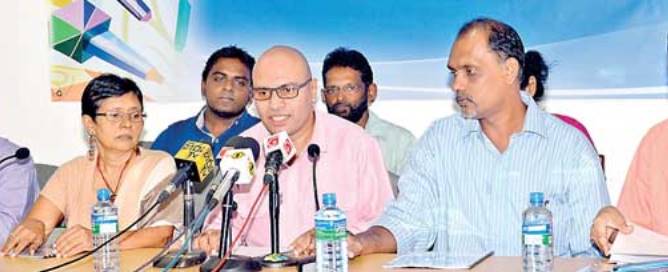A collective of journalists and media activists yesterday called to the attention of all political parties contesting the upcoming parliamentary elections a series of recommendations for media reform and freedom of expression in Sri Lanka that included the adoption of the much-hyped Right to Information Bill and the repealing of the controversial Press Council Act.
Issuing a joint statement, representatives from several journalistic bodies such as the National Secretariat for Media Reforms (NSMR), the Sri Lanka Working Journalists Association (SLWJA), the Free Media Movement (FMM), the Sri Lanka Press Institute (SLPI) and the Department of Mass Media of the Sri Palee Campus of the University of Colombo, said that while there had been some progress made since the presidential election in January this year, in terms of media freedom, more had to be done in order to ensure an environment more conducive for a free and fair media. Such policy, legal and structural reforms, the panel pointed out, would require the combined will of all political parties in the fray.
At a media briefing held at the SLIP yesterday that doubled as a presentation of the recommendations to representatives of political parties contesting the 17 August polls, the panel, headed by the Chairman of the NSMR and Head of Department of Mass Media, Colombo University, Dr. Pradeep Weerasinghe, urged all parties to give a firm commitment to their 10 recommended measures for meaningful media freedom and reforms.
Science communicator and media researcher Nalaka Gunawardene, who serves as an advisor to the NSMR, said that in the wake of the 8 January polls several steps had been made in the right direction with regard to media freedom and freedom of expression.
These included steps being taken to end threats against and pressure on media organisations and journalists; the unblocking of arbitrarily blocked political websites, the 19th Amendment to the Constitution recognising the right of access to information as a fundamental right and the Government’s open invitation to exiled journalists to return to Sri Lanka.
What with an important election around the corner and an increasing number of political parties contesting on a platform of change, the media collective pointed out, it was important that contestants be informed of exactly what changes needed to be made to ensure media freedom and freedom of expression in the country.
In this regard, according to the joint statement, the panel said priority must be given to adopting the Right to Information Bill which was finalised in May this year, with input from media stakeholders while the Press Council Act No. 5 of 1973 should be repealed. The Government-controlled Press Council should also be abolished and in its place the Press Complaints Commission of Sri Lanka (PCCSL), the self-regulatory body established in 2003, should be strengthened with its scope expanded to cover broadcast media.
International freedom of expression standards
Civil and criminal laws including the Prevention of Terrorism Act, the Official Secrets Act, sedition laws and rules on contempt of court and parliamentary privileges that may curtail media freedom by posing various restrictions on its function should be reviewed and revised to bring them in line with international standards of freedom of expression.
The panel also touched on the various atrocities committed against their journalistic brethren in the recent past, calling for an independent Commission of Inquiry with a mandate and adequate powers to investigate past killings of, threats to, disappearances of and other attacks on journalists, media workers and media outlets, with a view to ensuring that those responsible are prosecuted and that appropriate compensation is paid to the victims and their families.
Improvements recommended in other areas included broadcast regulation, providing for, among other things, proper planning in relation to the frequencies allocated to broadcasting which recognises public, commercial and community broadcasters, and obligations for broadcasters to be balanced and impartial in their coverage of politics and other matters of public concern. The panel called for the establishment of an independent Broadcasting Authority to regulate the entire broadcasting sector in the public interest.
Additionally, any broadcasting regulation introduced should support the development of community broadcasting services. The three state broadcasters – the Sri Lanka Rupavahini Corporation, the Sri Lanka Broadcasting Corporation and the Independent Television Network – should also be restructured into independent public service broadcasters that enjoy editorial independence and have a clear mandate to serve the public.
The Associated Newspapers of Ceylon Ltd. (ANCL or Lake House) also needed to operate independently of the Government, said the panel and recommended that a public consultation to determine the most suitable course of action in this regard.
Among the measures recommended to political parties is a firm call for a review of laws and regulations that permit censorship such as the Public Performance Ordinance. No prior censorship should be imposed on the media but courts can review media content for legality after publication on an urgent basis where necessary.
There should also be no attempts to limit online content or social media activities contravening fundamental freedoms guaranteed by the Constitution and international conventions, the panel declared, adding that restrictions on illegal content may be imposed only through an independent judicial process which ensures that fundamental rights to access information and freedom of expression are not hindered.
Lastly, the State should respect and protect the privacy of all citizens, the joint statement said, with strict limits to the state surveillance of private individuals’ and entities’ telephone conversations and electronic communications. However, in the event that it was deemed necessary, such surveillance should only be permitted with judicial oversight and according to a clear set of guidelines.
Pix by Lasantha Kumara
FT
